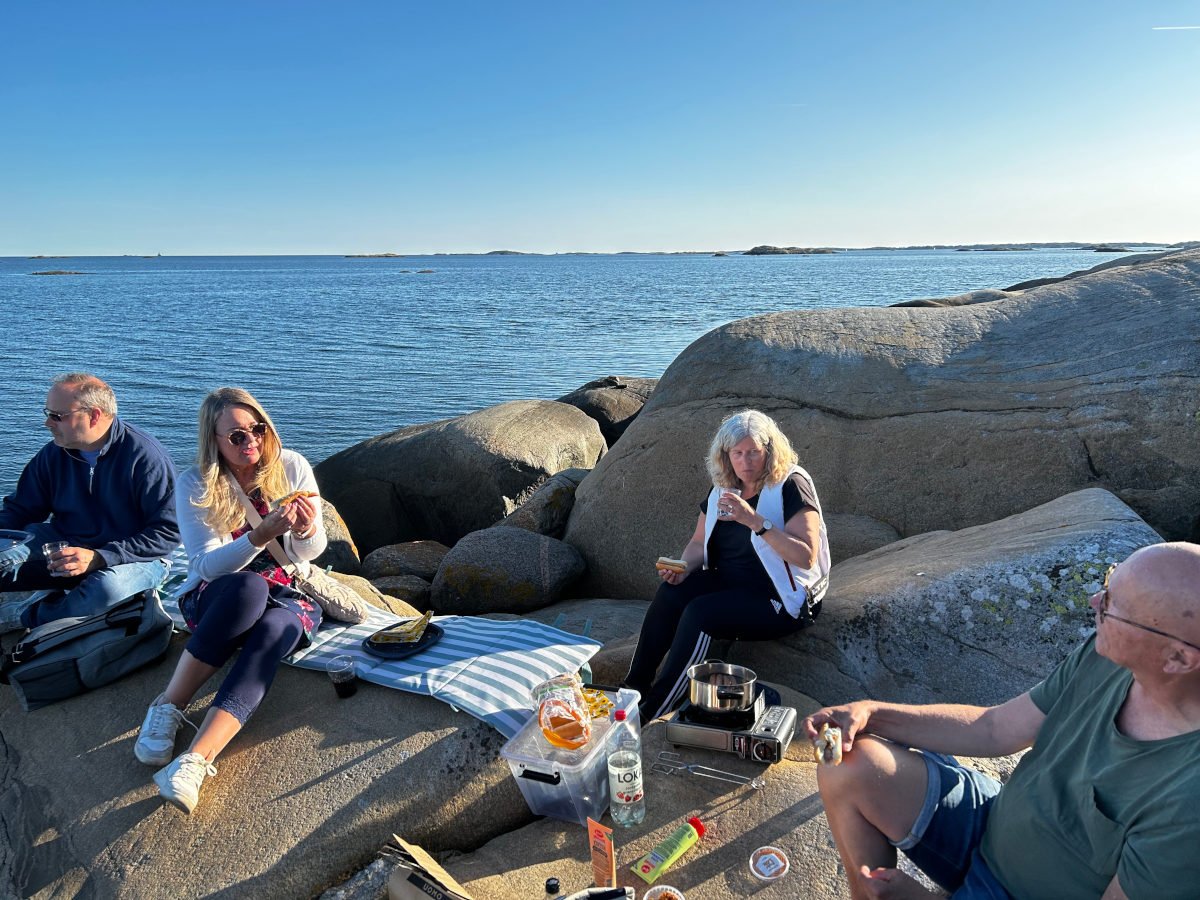Nearly 70 percent of the 110 respondents were women, almost all of whom were in a relationship with or married to a male Swede. And they came from across the world, meaning the cultural clashes they described varied depending on where the non-Swede in the relationship came from.
About fifteen respondents came from each of Western Europe, North America, and Asia, there were seven respondents from each of Eastern Europe and Southern Europe, ten from Latin America, three from the Middle East, three from Africa, and two from Australia.
Bad at communicating feelings
By far the most common complaint, which seemed to be felt by all respondents, more or less regardless of where they come from, was that the Swede in their life was emotionally distant and bad at communicating their feelings.
“Since Swedes are so non-confrontational, if they’re upset, and they don’t share that with you, it ends up becoming a much larger problem than it has to be,” says one Indian woman who is ‘going steady’ with a Swedish man in Stockholm.
“I grew up with the culture that if I have a problem, I will hash it out then and there, and then the issue is resolved and forgotten. But when issues are not hashed out, they turn into resentment. The Swedish way is ‘don’t share, but also don’t forgive or forget’ which is so much worse for a relationship.”
“A different approach to disagreements has caused trouble in the past,” agrees an Englishman who works as a teacher in Stockholm and is married to a Swede. “A reticence to discuss things is my experience. I’d say this is a facet of the stereotypical reluctance to socialise.”
A 28-year-old from a Western European country said she struggled with her Swedish boyfriend “not opening up easily about negative feelings”, and “not being communicative about personal topics as much as people in my country”.
If you raise your voice you lose
Many respondents complained that when tension in their relationship boiled over, they felt they were not permitted to raise their voice.
“Raising my voice a little is ‘shouting’,” complains Lisa, a 32-year-old Dutch woman who is married to a Swede.
“He expects me to be pleasant all the time,” complains one Taiwanese women in her late 30s who lives in southern Sweden. “Can’t be ‘otrevlig’ [unpleasant] even if you’re irritated or upset.”
Others made the opposite complaint, that their Swedish partners had tended to explode into rage.
One woman, who wished to be referred to as a “Brazilian banker”, complained the Swedish men she had been in relationships had “zero emotional intelligence: they are not good at handling their own emotions. They seem lovely, until they lose control, then they become extremely toxic.”
“He can come across as disinterested when we’re having a disagreement because he always remains so calm,” complained one American woman.
Not saying ‘please’, lack of affection and romance
The American also said she struggled with the blunt way Swedes communicate with their loved ones. “He’s much more direct. For example I’d say ‘can you please…?’, while he’ll just tell me what to do.”
Gemma, another American, who is married to a Swede in the UK, said she struggled with her husband’s “abruptness, lack of politeness, and lack of ‘gentlemanly’ affectionate habits and attitude”.
A lot of respondents complained of a lack of overt affection, or romantic actions from their Swedish partner.
“He doesn’t care about romantic details, for example flowers or surprises,” complained one Latin American woman, while a divorced French woman claimed her Swedish husband had been “too materialistic, not romantic, and quite stingy too”.
Amanda, from the US, said that she had a problem with her husband “not saying I love you… and instead just calling her ‘älskling’ [darling].”
“He shows very little affection and attention when I am sick,” said one Turkish woman who has long been married to a Swede. “For him sickness is a normal part of life and should be spent as normally as possible. It is the complete opposite in my culture.”
But very open and pragmatic when it comes to sex
When it comes to sex, several foreigners complained about their partner’s pragmatic approach, with more direct demands put on them than would be the case back home, and also calls for open relationships.
“Swedes are very direct compared to the Irish in the bedroom department,” said James, a 43-year-old Irishman.
One Russian woman was not pleased about her ex-husband’s liberal approach, however.
“They want to live in an open relationship, sleeping around and totally assuming that is normal. I heard it many times from many different people I dated. Obviously, all men of all nations want it, but Swedish society allows and supports that,” she said. “In general, their attitude towards sex is very easy-going and shallow.”
Paulo, from Spain, complained that while he valued “monogamy and a strong male-led household”, his Swedish partner wanted an open relationship.
Low level of communication with others outside the relationship
A very common complaint was that the Swedish partner seemed antisocial and cold with people outside the relationship, and sometimes too direct and impolite. This seemed to especially be a problem for couples who had been together outside Sweden and then moved to the country.
“He can be awfully quiet sometimes,” joked Michelle from the UK, who has been married to her Swede for more than 30 years.
“Swedes are very direct and come across as rude in the UK,” said David, a 50-year-old IT professional married to a Swede, who also complained that his partner could be “boring at times”.
“British people are more ‘chatty’. Not so much a problem here, more when we were in the UK. Swedes are too direct at times,” agreed Claire, another Brit.
Douglas, a Canadian living in Malmö, said he had also found his big problem was “the difference in how people act towards strangers in Canada. We are way more friendly”.
“They were so much more open outside of Sweden,” complains another Canadian in their 40s, who also said her partner didn’t like “how Sweden has closed me up”.
One American who has been married to a Swede for 26 years complained that her husband was “ridiculously concerned about what other Swedes think of him”. He was, she said, “always obeying the rules and bending over backwards to conform to their expectations/be upstanding”.
One Ukrainian respondent had discovered that in stark contrast to men back home her sambo was “depressed the entire winter and hates going out in the cold”.
But people also rued the lack of hospitality or good manners their Swedish partner displayed.
“He will never offer a drink to a guest, instead insisting that the guest knows where the fridge is!” complained Louise, from London.
A Hispanic reader rued her husband’s “bad table manners”, and that he “doesn’t use napkins or wait for everyone to be seated before eating”, while Ernesto, from Mexico, complained that his partner had no ”mi casa es tu casa” (my house is your house) culture of hospitality.
A Hungarian lady moaned that her Swedish partner “never brings anything when he comes over, like a drink or snack”.
Low emphasis on family and education
Sweden’s individualistic culture does not normally place much value on more distant family ties, and this was particularly an issue from respondents from family-oriented countries such as Asia, South America, and the Middle East.
One Filipina woman complained that she and her partner got “zero support from family compared to Asian family-orientedness”,
“He says family is just your immediate family,” agreed a woman from Latin America, who also disagreed with her partner’s more easy-going approach to education.
“He believes the förskola [preschool] is not for teaching kids, just play,” she said. “I think kids learn the most in their first five years so why not teach them letters and numbers and writing?”
For people from more hierarchical counties also struggled to get used to the low level of discipline their partner exerted on their children.
“He has a lack of stricter discipline towards our five-year-old son, which I think is cultural,” says Kim, an academic who comes originally from the US.
What was the advice respondents gave on how to make it work?
Most respondents treated the survey as an exercise in catharsis, spending more time complaining than suggesting serious solutions to the manifold problems of inter-cultural communication they revealed. But a few common suggestions on how best to handle a relationship with a Swede did come out.
Be patient and ask questions
Several respondents suggested that the best way to get a Swedish partner to communicate what they want, how they feel, and about any problems they have is to give them time, listen, and ask questions.
“They need to speak up!” said Carolina from Barcelona. “So the best thing is to start listening to them too and adapt to their society.”
“This way you’ll understand them. Respect their differences and learn from them! I became a different person after being with a Swede for eight years, I became a better listener, respectful, open-minded, organized, calmer and caring of others type of person.”
Two Dutch respondents both counselled “patience”.
Do activities together
Swedes very often socialise by doing an activity rather than by just talking face to face, and several respondents said that they had made their relationship work by finding things both they and their Swede like doing together.
“Communication, patience, and finding activities in common,” said Willian from Brazil. “My boyfriend has been much more open to my culture after I started introducing it in small doses.”
“Don’t brag. Do not talk about yourself,” said one Asian woman. “Find something common to do together”, while a woman from Kazakhstan recommended “watching shows on SVT, going for walks more often, and having fika every day”.
One of the Canadian respondents said their relationship had been saved by regular vacations outside of Sweden.
“My partner opens up almost instantly when we get outside of Sweden and we have a great time and get to talk deeply about our experiences being in Sweden,” she said.
Be independent
Several respondents said it was important to build an independent life for yourself with your own friends and not to rely overly much on your Swedish partner.
One respondent from the Mediterranean said that a big mistake was “not being independent, not having your own economic stability”.
| Banner ad |
Tone yourself down
This can be difficult, but several respondents said they had had to tone down their behaviour, become quieter, learn not to interrupt, and to become less loud in public.
“Be calm, respect the rules (including social ones), don’t be loud, drink alcohol (to socialize), don’t show off, be lagom, don’t have strong opinions,” said one of the Dutch women.
“I keep my voice down and in a somehow levelled way, I don’t overshare. I try to make a summary in my head about the stories I want to tell before telling them,” said a woman from Latin America. “Answering this questionnaire I noticed how much work I put into my communication, and I do speak Swedish so I kinda feel exhausted!”





 Please whitelist us to continue reading.
Please whitelist us to continue reading.
Why are all the articles you write so negative? Anything positive to say about Swedes and Sweden?
Wonderful article, tack så mycket, very interesting prospective!
Would be really nice to know also what drives them, what they see in the partner that makes them make all the efforts.
I found very common to read around how good and wonderful is the Swedish society but not very much about the good things of the Swedes themselves, which doesn’t make any sense to me since they have built it.
I have always the impression that people like to live in Sweden despite the Swedes instead of “because” of them. [Which I don’t believe is true]
I’m personally very attracted by them, I feel soo related, way much more than I ever been in my own country!
[and we, as countries, are in the opposite spectrum]
My ex was abusive- financially, emotionally, physically..completely emotionally unstable. When I called him out on it ..he responded ” its my house ..I can abuse you as much as I want” Then he threatened to report me to migrationverket to send me home, throw me out of my house like yesterday’s trash just so he could get on with his life with other women.
Needless to say ..we ended up going to court ..first for abuse which the jury found him guilty for his actions..but not abuse ..
then another for a division of property.
I wish I could say I met a bad person ..but unfortunately similar behaviour and characteristics ..even in small doses, still appear within these social situations.
Needless to say ..I keep my distance..so it’s OK if I don’t have so many friends .
Run 🏃♂️